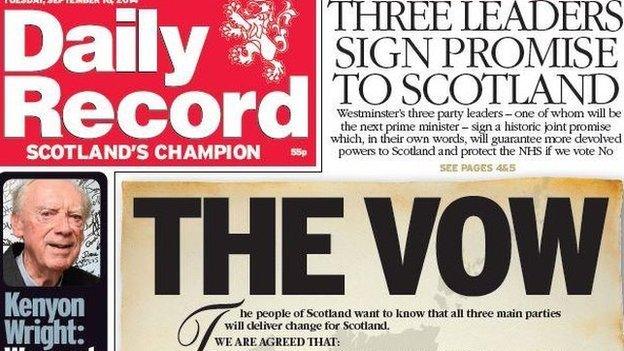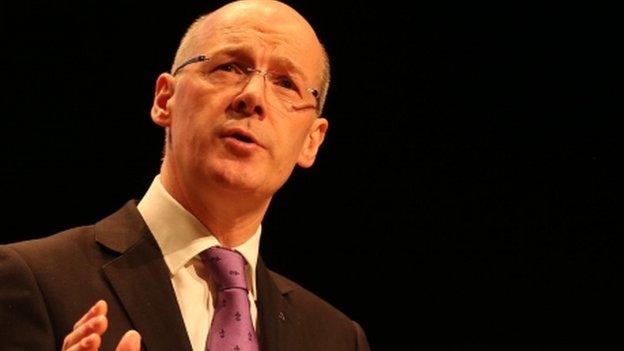MSPs argue over the 'vow' on more Scottish powers
- Published

The vow was signed by David Cameron, Ed Miliband and Nick Clegg
Politicians at Holyrood have been arguing about whether the pre-referendum vote "vow" pledging more powers for Scotland had been met.
Deputy First Minister John Swinney said promises by the three UK party leaders had "simply not been delivered".
The Scottish Tories, Scottish Lib Dems and Scottish Labour strongly disagreed with the SNP MSP.
The argument was sparked during a statement by Mr Swinney about the Smith Commission on new Holyrood powers.
The day after Scotland voted "No" in the independence referendum, the coalition government at Westminster appointed Lord Smith to look at greater devolution to Scotland.
His commission, which was made up of 10 party representatives, published its recommendations last week, external.
It said the Scottish Parliament should be able to;
set income tax rates and bands
be given powers to allow 16 and 17-year-olds to vote in Scottish elections
have control over Air Passenger Duty
and be given a part share in VAT receipts.


ANALYSIS
By Glenn Campbell, BBC Scotland political correspondent
David Cameron, Ed Miliband and Nick Clegg promised Holyrood "extensive new powers" in the event of a 'no' vote in the independence referendum.
The three pro-union leaders believe the Smith commission agreement on further devolution, when enacted, will redeem what became known as their vow.
The commission recommends a package of extra tax and welfare powers that Lord Smith said would amount to the biggest transfer of power from Westminster to Holyrood since devolution.
But today, in parliament, the deputy first minister John Swinney said that was not extensive enough. "The vow" he said "has quite simply not been delivered".
In response, Labour's Iain Gray said the Smith agreement would result in "more extensive powers devolved than in federal Germany or in federal Australia.
"This is the vow delivered" he said.
Expect the battle for public opinion over Smith to intensify as the UK general election draws nearer.

In his statement to MSPs, Mr Swinney said: "On behalf of the Scottish government I welcome the contents of the report but regret that a wider range of powers has not been delivered.
"The report contains a number of recommendations that will enable this parliament to better serve the people of Scotland."
However, he added: "The proposals mean control over 71% of taxes in Scotland remains at Westminster along with 85% of welfare decisions - including the conditions and sanctions that are causing so much distress in our country.
"These proposals cannot be characterised as home rule or as near federalism as is possible in the UK. The vow has simply not been fulfilled."

John Swinney welcomed the Smith report's contents but he said "the vow" had "simply not been delivered"

Iain Gray, Willie Rennie and Annabel Goldie rejected John Swinney's argument over "the vow"
Labour's Smith Commission representative, Iain Gray, insisted that with the proposed new powers Scotland could choose to reintroduce the 50p tax rate for tope earners and a 10p rate to help low earners.
He said: "We can redesign the whole work programme to get people into work more effectively, redeploy hundreds of millions of pounds worth of disability benefit to re-inject dignity and respect into the system.
"We can attack child poverty by supplementing child benefit for families under stress. We can construct a whole new Scottish welfare system of new benefits of our own design."
Mr Gray added that "this is the vow delivered. Scotland knows it".
Fellow commission member and former Conservative leader Annabel Goldie said the proposals would result in a "sweeping transfer of new powers to this parliament".
She said: "This agreement is a constitutional development of huge significance. The proposed changes are more wide ranging and powerful than I think was expected."
And Scottish Liberal Democrat leader Willie Rennie challenged Mr Swinney, saying: "The government could embrace these new powers, these new radical powers for Scotland. Or is he just going to forever re-run the referendum that he just lost."